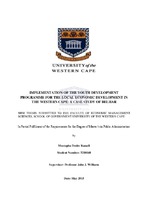| dc.contributor.advisor | Williams, John J. | |
| dc.contributor.author | Kazadi, Mustapha Desire | |
| dc.date.accessioned | 2015-11-03T14:38:23Z | |
| dc.date.available | 2015-11-03T14:38:23Z | |
| dc.date.issued | 2015 | |
| dc.identifier.uri | http://hdl.handle.net/11394/4617 | |
| dc.description | Masters in Public Administration - MPA | en_US |
| dc.description.abstract | The Republic of South Africa is faced with an extremely problematic high rate of poverty, shortages of skills and youth unemployment. This phenomenon is amongst blacks (predominantly African and coloured). This thesis therefore, argues that job creation is a very important measure to address youth unemployment and related socio-economic problems though; the majority of youth in South Africa have been classified as unskilled, uneducated and unemployable. The implementation of skills development programmes remains a huge problem. It has been also assumed that youth development programme have been inaccurately interpreted. TheYouth development is an evolutionary development in which all young people are engaged in attempting to build skills, and competencies, to meet their social needs and for the development of the community (Pittman 1993: 3). It is in this regard that the researcher selected Belhar in the Western Cape as a setting to investigate the problematic mentioned above. Although the 2011 census report stated that people living in the area of Belhar have access to electricity, refuse removal, water and sanitation, up to now poverty and youth unemployment remain alarming in this community. The study indicates that there is a youth development policy existing on paper at all levels of South African governments however its implementation remains a major problem. The research is exploratory in nature and uses qualitative techniques of inquiry. The researcher also uses secondary data such as conference papers and the City of Cape Town’s budget documents as a form of gathering information for analysis. The study explores the present youth programme and local government’s capacity in the surrounding community of Belhar. The data collected during this study through interviews, reveals that the youth programme is in existence in Belhar, however there is incapacity and lack of cooperation between the councilors, Belhar youth leaders and the City of Cape Town’s Municipality. The study further reveals that since ever the youth programme started in December 2013 under the leadership of the Belhar councilors, there were only two beneficiaries from the “youth” of that entire community who got employment after attendance for skills training. The finding further indicates that the programme mostly did not achieve its goals. | en_US |
| dc.language.iso | en | en_US |
| dc.publisher | University of the Western Cape | en_US |
| dc.subject | Youth development programmes | en_US |
| dc.subject | Belhar | en_US |
| dc.subject | Local economic development | en_US |
| dc.subject | Youth unemployment | en_US |
| dc.subject | South Africa | en_US |
| dc.title | Implementation of the youth development programme for the local economic development in the Western Cape : a case study of Belhar | en_US |
| dc.type | Thesis | en_US |
| dc.rights.holder | University of the Western Cape | en_US |

